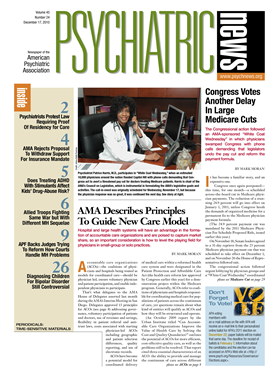Two decades of legal fights over California's treatment of prisoners with mental illness reached the Supreme Court this year when the Court agreed to review the central issue of prison overcrowding.
The case has drawn amicus briefs from APA and other mental health organizations and advocacy groups, which view overcrowded prison populations nationwide as one of the biggest barriers to the provision of quality mental health care for prisoners with mental illness.
APA and other groups in the mental health field filed their amicus brief at the beginning of November in support of a lower federal court's ruling that California must release more than 38,000 inmates from a state system that is at twice its capacity so that the state can provide mental and other types of medical care to which prisoners are entitled under Supreme Court interpretations of the U.S. Constitution's protections from “cruel and unusual punishments.”
California opposes the lower-court order on the basis that the overcrowding issue is beyond the mandate of the three-judge panel that issued it and that has provided oversight of medical reforms (including the extent of and manner in which mental health care is provided) in the state's prison system.
The Supreme Court review of the case, Schwarzenegger v. Plata, follows hearing 20 years of California lawsuits by inmates' advocates seeking improved mental and other types of health care. The Court heard arguments in the case on November 30.
The Court's eventual ruling on the overcrowding issue is critical to prisoner health, according to mental health advocates, and is potentially precedent-setting for prisons across the nation.
“The key [issue] is the extent and impact of overcrowding on the mental health care of prisoners,” said Paul Appelbaum, M.D., a past president of APA and a member and former chair of APA's Council on Psychiatry and Law, in an interview with Psychiatric News. APA's amicus brief, he said, outlines the extent to which overcrowding is “the prime negative factor for mental health delivery.”
Overcrowding has undercut the delivery of mental health care in the California penal system, according to the amicus brief, resulting in inadequate medication management, poor access to clinicians, lack of suicide prevention programs, deficiencies in medical-record keeping, and other problems. Appelbaum and others noted that the inmate population is too large to recruit enough clinicians to provide quality care, given budget constraints.
Additionally, the amicus brief cited research and clinical knowledge of mental illness factors showing that prison overcrowding can exacerbate existing mental illness.
Treatment Requirements Lacking
“Clinical experience supports the conclusion that crowding may create pervasive and intractable problems for the provision of minimally adequate mental health care,” the brief states. “To ensure that prisoners are evaluated for mental illness and afforded minimally adequate treatment, there must be sufficient clinical staff, space in which to provide treatment and perform screening and clinical evaluations, and clinical facilities to accommodate inmates requiring higher levels of care.”
Such overcrowding, which necessitates the use of gyms and community rooms as dormitories, has additional negative effects on inmates' mental health. The unavailability of gyms and community rooms for their designed purposes and the lack of proper sleeping facilities prevent activities needed to help keep prisoners mentally healthy, including proper sleep, exercise, and vocational activities, Lewis Bossing, a senior staff attorney at the Bazelon Center, told Psychiatric News.
APA was joined in its brief by the California Psychiatric Association, American Psychological Association, California Psychological Association, American Academy of Psychiatry and the Law, Forensic Mental Health Association of California, National Alliance on Mental Illness, and Bazelon Center for Mental Health Law.
“We thought it was important to remind everyone that there is a constitutional standard for mental health care,” Bossing said.
Despite a federal court takeover of the supervision of California's prisoner health care system in the 1990s and successive increases in clinical staff and treatment facilities, the state has been overwhelmed by a “tidal wave” of new prisoners in the last 15 years, Appelbaum said. An increase in the prison population was accompanied by a flood of inmates with mental illness, including up to 18,000 such inmates in 1995 and 34,000 in 2008, according to state estimates.
Law Said Judges Can Intervene
Such burgeoning prisoner populations nationwide led to the Prison Litigation Reform Act (PL 104-134), which was enacted in 1996 and authorized panels of federal judges to issue prisoner-release orders in state prison systems but only when prison overcrowding is the primary cause of a violation of a constitutional right and when no other action will correct the problem.
A three-judge in California ruled in January that although prison overcrowding was not the only cause of the constitutional violations, it was the primary cause of a lack of constitutionally adequate mental and general health care. The panel of judges concluded that reforms of the prison health care system were impossible until the overcrowding was addressed. They ordered California to cut its prison population within two years from 200 percent of its design capacity to 137.5 percent, which would require the early release of up to 46,000 inmates.
The California prison system population is currently 165,000, though it was designed to house only 80,000.
Any long-term solution to the conflict between the needs of burgeoning prison populations and the needs of inmates with psychiatric disorders, Bossing said, will have to include aggressive jail-diversion programs and other treatment interventions for those who are arrested. Otherwise large numbers of people with untreated psychiatric conditions will continue to add to the overcrowding and aggravate the problems of prisons' already inadequate treatment system.
